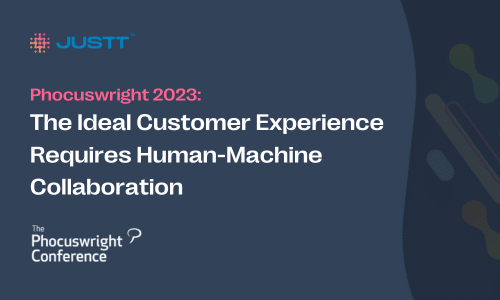Phocuswright 2023: The Ideal Customer Experience Requires Human-Machine Collaboration

Consumer demand for travel is strong was one of the main takeaways from conversations held on and offstage at Phocuswright 2023 in Fort Lauderdale earlier this month. The main reason why is a surge in demand for new consumer experiences post-Covid, of which travel is a major beneficiary.
"I fundamentally believe that consumers have been forever changed since Covid....I think everybody has changed,” said Expedia CFO Julie Whalen at the event. “And I think that they realize that experiences and doing things, having adventures and being with people, meeting people and understanding new cultures is really what we want to do now for the foreseeable future."
Using generative AI in the travel booking process
That doesn’t mean there still isn’t room for improvement. Expedia, according to Whalen, is looking to use generative AI to remove some of the friction in the travel process. For example, the company would like to help consumers rapidly sort destination choices based on personal preferences to five or so choices and then let the consumer research each option from this narrower set more thoroughly.
“That's part of the process that people like about travel,” said Whalen. “They like a little bit of that, you know, researching and kind of thinking about it, the anticipation of the trip, before they even go on the trip.” She added that because of that, she doesn’t think a bot will ever entirely replace trip research, since most humans find doing some advance research ahead of their trip selection an enjoyable part of the process.
Other uses of AI in travel
Other travel companies are using AI differently. For example, Lufthansa has invested in customer service chatbots. "We have a specific focus right now on conversational AI, since we've come out of the global crisis, really realizing that if we need to scale our customer service, chatbots specifically can add value,” said Christian Spannbauer, CTO of Lufthansa Digital Hangar.
In general, AI for customer service is super important as disruption has become more of the norm in the travel industry. For example, 200 million passengers in the U.S. were affected by delays and cancellations in 2022, according to Charuta Fadnis, SVP of Research and Product Strategy at Phocuswright. Similarly, Fadnis stated that 22.5 percent of U.S. flights were delayed in 2023 to date. This large volume of air passengers affected by disruptions is not evenly distributed across time but has its peaks and valleys as you would expect. This means customer service teams must utilize technology to quickly ramp up activities to rapidly address customer issues before they significantly impact customer satisfaction and customer lifetime value.
Brian Davis, Senior Vice President & Chief Marketing Officer of Sun Country Airlines, explained at the conference the difficulty of re-booking customers from canceled flights – with each customer having different rebooking preferences based on their specific needs. Moreover, disruption tends to affect multiple flights at one time, making a regular call center solution with human beings difficult to scale. Sun Country Airlines (the 11th largest mainline carrier in the U.S.) now uses a self-serve menu to enable customers to re-book alternative flights and other travel arrangements when a flight is disrupted. However, Davis said that in the future Sun Country will use AI to predict individual customers' preferred outcome for re-booking to speed along the process.
While AI has yet to be fully integrated into the travel industry, AI in general is no longer a new technology. Various companies in the travel industry have been implementing AI in various ways for over a decade now.
Something as commonplace today as recommendation engines use AI as well and their positive impact on consumer consumption decisions is well-known. Around 25 percent of the sales of online travel agency (OTA) Hopper come from recommendations users did not ask for. Moreover, when the recommendation comes from AI, the conversion is almost three times higher than when Hopper responds to specific user queries.
The caveats of using AI and machine learning in travel
Machine technology helps improve interaction with humans by adding scalability, consistency, efficiency and availability. However, using AI in travel often involves significant upfront investment.
"These [AI] models really take the time and effort to train on all that stuff, you should be very cautious in terms of return on investment,” warned Spannbauer in the panel session on AI Exploits and Explanations.
In addition to significant upfront investments, the impact of the AI on your company’s operations and bottom-line is still dependent at the end of the day on how the technology is utilized by the end-users who feed data into it and get data out of it.
“While we can make investments in technology, they are only as good and as useful as the end users and the inputs that are fed into it,” said Davis at the conference. “So it's kind of like every step of the way, we have to re-educate folks and to get the full use of the tools."
Meanwhile there are elements of business that still have not and likely will not be replaced in the near future by machine technology. Empathy, creativity and the need or desire for a human connection are things humans provide businesses in the human-machine collaboration.
Paul Weaver, Vice President of Global Digital Product Design at the Hyatt hotel chain, praised the AI technology coming into use, but also called for maintaining some balance in businesses' approach to interacting with consumers. “There's a degree of authentic authenticity and a degree of care that has to be upheld [in hospitality],” said Weaver. “And a degree of simplicity… we've got AI systems running, mostly invisible, and frictionless through our end users."
The key, at least according to Weaver, seems to be in keeping AI in the background and largely invisible to consumers. They don’t need to know they are interacting with artificial intelligence, and they should experience a frictionless process towards achieving their end goals regardless of whether it is machine or human assisted.
That was also part of the message of Justt's presentation during the Innovation Launch at the conference. By automating and using AI in the process of collecting and presenting evidence to defend against credit card chargebacks, Justt enables the staff at travel merchants to focus on providing an exceptional customer experience to clients instead of getting bogged down in credit card rules and regulations. Not only is this important for keeping employees focused on what drives the business, but it also enables better customer service that can help prevent the filing of chargebacks in the first place. The goal, as always, is a positive, frictionless experience for customers as they travel.
Keep the AI coming, but don’t lose the human touch
A major message of Phocuswright 2023 was that the world of travel has changed because of the disruption in the past few years, essentially since the outbreak of the Covid-19 epidemic. Travel demand is strong, but the increase in disruptions makes the adoption of AI for customer service a necessity and there are benefits to adopting AI in other areas of the business as well. Besides the usual business concern of monitoring the return on investment on any new technology deployed, the key with AI in the travel space is to retain elements of human interaction and thinking that the consumer wants. For example, the ability to sort through a curated shortlist of travel options. Or, authentic, human interaction with hotel staff that is aided, but not replaced, by artificial intelligence.
With these points in mind, the benefits of human-machine collaboration are bound to improve the travel experience for customers worldwide.







